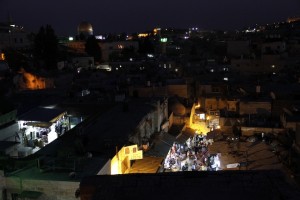 I recently returned from dinner with Lukas, a German volunteer who will live here for a year in total. We enjoyed a Greek salad, hummus, and tabbouleh with fresh pita. While paying our bill, the entire restaurant staff was gathered round a large LCD TV, watching live video of two bodies burning inside a car in Gaza.
I recently returned from dinner with Lukas, a German volunteer who will live here for a year in total. We enjoyed a Greek salad, hummus, and tabbouleh with fresh pita. While paying our bill, the entire restaurant staff was gathered round a large LCD TV, watching live video of two bodies burning inside a car in Gaza.
The owner turned to me, Lukas, and the young man who was managing our bill, his hands held up by the sides of his head, “They were two journalists. One, two journalists. The Israeli rocket landed
To my front as I turned away from the TV, the young man returned my card and said quietly, “Who are the terrorists?”
The suq (market) was mostly closed down, save one or more vendors hoping to catch the last of the tourists who now walk casually through the Old City, following the stations of the cross without the pressure of the crowds, admiring ornate church doors, or simply trying to haggle a last good deal before flying home. I had scheduled a hair cut appointment around the corner, at the intersection of Muristan and the street which comes in from Damascus Gate. But when I arrived, the barber yet had one man in the chair, his face covered in foamy soap, about to be shaved with a straight razor while another customer sat waiting.
Its surreal, to be honest, to be just one hour’s drive from where people are burning. I want to do something, anything, but there is nothing I can do. It doesn’t matter if I was an EMT or with a humanitarian aid organization, no one is allowed in or out of Gaza. Even before the rocket battle, the permits were granted infrequently and only at the invite of an existing, approved organization. Sometimes the wait list is years, but mostly never accepted at all.
I read what I can. I watch videos when I have time. The complexity of the story continues to unfold, as the politics of the situation come to the surface. I see similarities to the many U.S. lead invasions and incursions and military actions which did not require a congressional Act of War in the past fifty years. I see ratios of death—hundreds in response to a handful not unlike hundreds of thousands in response to three thousand, and see clearly the strength one nation does hold over another when the rest of the world refuses to stand up and say “no more.”
I am not saying Israel is or is not justified in some way, but when so many civilian lives are lost and no one is held accountable, as with the U.S. in Afghanistan or Iraq, it only further supports my belief that at the core of being human is the ability to disarm that part of us, compassion or empathy or both, which sees our adversaries as human too.
Here, at the Church of the Redeemer, I sat for an hour between dinner and a lecture about “Friends of the Earth.” The talk was about the effort to restore the drastically diminished (5% of its original flow), heavily polluted (warning to Christian pilgrims: raw sewage flows from Tiberius), and overused (Syria, Jordan, and Israel all raise non-native, water hungry species such as bananas and mangoes while serving growing populations) Jordan River to something closer to its original flow.
At the front desk Palestinian Melvina, a nineteen old daughter of one of the church’s employees, welcomed attendees in Arabic, English, and German. She asked how I felt about the U.S., what I missed and what I did not. Of course, I spoke in depth about the National Forests and wilderness, the places I miss most when traveling for no other country in the world has preserved places with such diversity as these. I got a little carried away, missing the Colorado Rockies and the high Utah desert when she interrupted me with a degree of maturity that caught me off guard, “What about the other side? What about those things which do not work?”
Of course, I knew what she was getting at for it could not be avoided. “I am sad … no, I am deeply disturbed that our—my tax dollars, money which left my own hands is paying for the death of your people. It’s disgusting, to me.” She nodded her head and I looked at the floor, wishing I could say something more.
